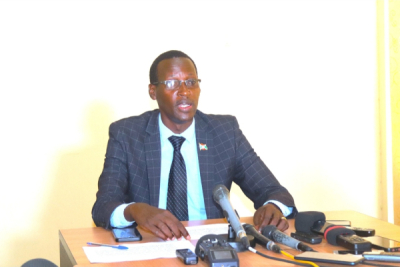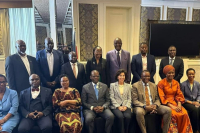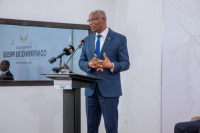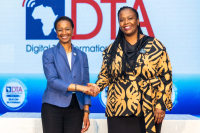
Tech (805)
Morocco is firmly committed to digital transformation. Recognizing that human resources are the cornerstone of this endeavor, the country is implementing initiatives to modernize educational programs by integrating digital skills from an early age.
The University of Moulay Ismail signed a partnership agreement with Cisco Network Academy, a global online learning platform offered by American technology giant Cisco Systems, on Wednesday, May 8.
This collaboration, established during a visit by a Cisco Network Academy delegation to Morocco, is designed to equip students and faculty with in-demand digital skills in critical areas like computer networking, artificial intelligence, programmable infrastructure, and cybersecurity.
The initiative aligns perfectly with Morocco's "Pacte Esri 2030," the National Plan for Accelerating the Transformation of the Higher Education, Scientific Research, and Innovation Ecosystem by 2030. This strategic plan emphasizes preparing students with the necessary personal, cross-disciplinary, and digital skills to meet the evolving demands of the job market, reflecting both royal directives and the global digital revolution.
The partnership builds upon a tripartite agreement signed last December between the Moroccan Ministry of Higher Education, the Ministry of Digital Transition and Administrative Reform, and Cisco.
Furthermore, this new collaboration aims to strengthen the training and certification programs offered through the "Centres code 212" hosted by Moroccan universities. Students and teachers will gain free, unlimited access to Cisco's partner training programs, along with support in preparing for industry-recognized certifications.
By prioritizing youth training and upskilling the population in digital capabilities, Morocco seeks to cultivate a robust pool of graduates equipped with specialized knowledge in innovative fields. This initiative aims to accelerate the nation's digital transformation journey and position Morocco as an attractive destination for both domestic and international investors.
Samira Njoya
The Gambia has made significant progress in its digital transformation journey. To advance even further, the country is receiving support from the organizations it belongs to, such as ECOWAS.
The President of the Economic Community of West African States (ECOWAS) Commission, Omar Alieu Touray, and the Gambian Minister of Digital Economy, Ousman A. Bah, signed a grant agreement on Friday, May 3, during the 15th Summit of the Organization of Islamic Cooperation (OIC).
This $180,000 grant aims to strengthen The Gambia's digital infrastructure and enhance the country's governance through new technologies.
This initiative is part of an ECOWAS strategy to strengthen the digital capabilities of all its member states. It comes at a time when The Gambia is intensifying its efforts to accelerate digital transformation and improve telecommunications infrastructure to provide its population with innovative new services.
Currently, the country is working on a comprehensive digital strategy set to launch in the coming months. Additionally, The Gambia is preparing to connect to a second international fiber optic submarine cable, funded by the World Bank at a cost of $30 to $35 million. The government is also considering enhancing national connectivity via satellites.
The ECOWAS grant is expected to support the implementation of this strategy, which includes digitizing administrative services, improving citizens' digital skills, and creating a standardized digital identification system, among other initiatives.
Samira Njoya
The Burundian government has pledged to modernize services offered to citizens. However, several regions of the country still lack comprehensive internet coverage and digital skills, limiting access to digital services in these areas.
On Monday, April 29, the Ministry of Communication, Information Technology, and Media announced the launch of a national survey on ICT access and usage among households, businesses, and public administrations in Burundi. This initiative aims to assess the state of digital service usage and access while identifying the knowledge and needs of the Burundian population.
According to Thierry Kitamoya (photo), Assistant to the Minister for ICT, this survey is part of the Digital Economy Foundations Support Project (PAFEN), financed by the World Bank to the tune of $92 million. The PAFEN aims to expand broadband internet access for underserved populations, enhance the government's capacity to provide digital services, and lay the groundwork for accelerated digital economy development in Burundi.
The survey, which began on April 29, will continue until May 17, led by the Burundian Center for Population and Development Studies (CERPED) and the Tunisian company SFM Technologies. The survey will target varied samples across different communes and provinces to provide a comprehensive overview of ICT access and usage in Burundi.
The survey results will inform the design and goals of digital access programs, the formulation of new broadband policies, and the assessment of ICT penetration levels in Burundi.
Access to high-speed internet connectivity is now indispensable in Africa, where digital transformation is accelerating. However, the high cost of internet remains a significant barrier for a population eager to take advantage of new technologies.
The Malagasy government has rescinded its recent decision to raise the price of a gigabyte of data to $0.95, reversing a policy introduced last month. This U-turn was announced by the Ministry of Digital Development, Posts, and Telecommunications (MNDPT) in a statement following a review of internet service providers' pricing practices in the country.
"The government found that the artificially high prices maintained by telecommunications operators did not reflect the commitments made during negotiations. As a result, this measure aims to restore fair competition and reduce costs for end users," said the MNDPT statement.
Initially, the government had decided to raise the price of a gigabyte from $0.45 to $0.95, justifying this measure by arguing that it would promote a more equitable distribution of internet access across the country. However, this decision made internet access increasingly difficult for many Malagasy citizens, further widening the existing digital divide.
In response to their customers' needs, several providers did not implement the new rates. According to data from Kepios, a consultancy specializing in digital usage studies, Madagascar had 3.8 million social media users as of January 2024. Following the price hike, many internet users were forced to cut back on their internet-related expenses or visit cybercafés, thus turning what was once a widely accessible service into a luxury product in Madagascar.
The suspension of this decision is expected to pave the way for new discussions between the government and the country's mobile operators. A potential reduction in prices should help liberalize the market and allow various users to reconnect with the internet, which is a crucial tool for students, traders, and local startup founders.
Samira Njoya
Digital technologies are driving the rapid transformation of Africa's economy. Recognizing this, African leaders are ramping up efforts to establish high-quality digital services and expand access to high-speed internet.
African Information and Communications Technology (ICT) ministers have set a target to boost the continent’s internet access by 20% within the next five years. This resolution was reached at the Connected Africa 2024 summit, which took place in Nairobi from April 21 to 25. The summit concluded with a declaration aimed at fostering a digitally connected and empowered Africa, setting several ambitious goals for the continent’s digital transformation.
Kenya’s Minister of Information, Communication, and Digital Economy, Eliud Owalo, underscored the significance of collaboration in propelling Africa’s digital transformation during the summit’s closing ceremony. According to the official, by harmonizing digital policies across the continent, the continent can expedite its aspiration to become a leading global trade power under the African Continental Free Trade Area. He also disclosed a plan to equip one million young Africans with digital skills by 2027 ,through capacity building, to advance the collective vision of a digitally empowered Africa by 2030.
The 14 African ICT ministers who attended the Connected Africa 2024 summit will follow a comprehensive digital empowerment roadmap. This roadmap includes agreements, commitments, and political resolutions, such as initiatives to integrate digital skills into educational curricula, develop broadband infrastructure, facilitate digital trade via the African Continental Free Trade Area (AfCFTA), and encourage research and innovation in artificial intelligence.
The fourth edition of the Connected Africa summit is in line with Africa’s Digital Strategy 2063 and the African Union’s Vision 2030. The aim is to synchronize the efforts of African nations to hasten digital transformation and bridge the digital divide across the continent.
Samira Njoya
Morocco becomes the fourth African country to join UNESCO Digital Skills Initiative, Following Côte d'Ivoire, Egypt, and Nigeria
On Tuesday, April 23, Moroccan authorities, in collaboration with the United Nations Educational, Scientific and Cultural Organization (UNESCO) and Chinese tech giant Huawei, initiated a program aimed at enhancing the digital skills of educators, particularly those teaching literacy. The objective is to boost the digital competencies of 10,000 literacy educators by 2025. The launch was announced last week through press releases from both UNESCO and Huawei.
“Literacy is the foundation of lifelong learning and a driver for sustainable and participatory development. In light of the digital transformation, it is essential that literacy instruction leverages the full potential of technology. We are proud to support the Kingdom of Morocco as a member of the UNESCO Global Alliance for Literacy in improving the digital skills of 10,000 literacy teachers by 2025,” stated Isabell Kempf, Director of the UNESCO Institute for Lifelong Learning (UIL).
This program is a component of the national strategy for the digitization of education, which is part of the Morocco Digital 2030 strategy. The strategy aims to position the kingdom as a regional leader in digital education. In November 2023, the Moroccan government collaborated with American company Oracle to foster digital skills in higher education, thereby providing professors and students with access to training, learning resources, and specialized software.
In essence, the implementation of this initiative will enhance the quality of education in Morocco, better equip students for the digital era, and bridge the digital divide in the kingdom.
Adoni Conrad Quenum
Guinea is working on several digital projects and is seeking experienced partners to effectively bring them to fruition. The West African country is eager to move forward quickly with the implementation of these projects.
Guinea and the United States have expressed a shared interest in digital sector collaboration. Aminata Kaba, Guinea's Minister of Technical Education and Vocational Training, and U.S. Secretary of Commerce Gina Raimondo discussed this during the Smart Africa ministerial roundtable in Nairobi on Thursday, April 25th.
The meeting centered on the challenges and opportunities of digital transformation in Guinea and Africa at large. The need to bolster cooperation in Information and Communication Technologies (ICT) between the two nations was also emphasized, as noted by the Ministry overseeing the Digital Economy.
The discussions specifically focused on enhancing ICT cooperation, including an ongoing partnership with U.S. firm Cisco to establish a Networking Academy in Guinea. The dialogue also explored potential joint initiatives between Africa and the U.S. aimed at facilitating access to and adoption of technologies suited to the continent's needs.
Following the meeting, the Secretary of State announced an upcoming initiative that will offer young Africans the chance to participate in immersion experiences within the U.S. startup ecosystem, particularly in Silicon Valley.
The meeting forms part of Guinea's efforts to develop its digital sector through partnerships. For the U.S., it presents an opportunity to seek collaborations that will further the Digital Transformation in Africa (DTA) project. This government initiative seeks to broaden digital access across the continent. As part of this project, the U.S. invested $82 million in 2023 towards new digital infrastructures, digital projects, and technical programs in Africa.
Samira Njoya
Guinea has initiated the digitization of public services. This initiative aims to enable the country to benefit from the digital economy and requires the involvement of workers in this sector.
Guinean Prime Minister Amadou Oury Bah unveiled two new digital platforms on Wednesday, April 24th. The two platforms dubbed “e-Learning” and “e-conseil” aim to boost efficiency through innovative training and management tools for civil servants.
Developed with the National Agency for Universal Telecommunication and Digital Services, "e-Learning" provides online courses, accessible even without internet. These courses will enhance civil servants' skills in various fields and familiarize them with essential computer tools. Participants can earn verifiable certificates upon successful completion of training.
"e-conseil" allows different government departments to automate communication and workflow. This platform facilitates remote collaboration among government officials, allowing them to contribute to inter-ministerial council and cabinet meeting preparations, ultimately saving valuable time. Security is a top priority, with the platform employing robust, internationally compliant solutions. Data is securely hosted by the Regulatory Authority for Posts and Telecommunications (ARPT).
These platforms represent the Guinean government's commitment to digitizing and modernizing its administration. These digital solutions will equip civil servants with the necessary Information and Communication Technology (ICT) skills to thrive in the country's ongoing digital transformation. Their launch follows a recent workshop where the Prime Minister emphasized the importance of a unified effort to accelerate the digitization of Guinea's public administration.
Samira Njoya
In recent years, Huawei has become a focal point in the trade dispute between China and the United States. This has compelled the company to make a number of strategic shifts, such as overhauling its supply chain and creating a new operating system for its flagship devices.
Chinese tech giant Huawei is calling on developers to create applications for its homegrown HarmonyOS operating system. The announcement came from Eric Xu, Vice Chairman and Rotating Chairman of Huawei, during the 21st Huawei Analyst Summit held April 17-19 in Shenzhen, China.
"We call on all app developers and owners in China to join our HarmonyOS-native app ecosystem as soon as possible, and work together to deliver a better experience to consumers," Xu said. He emphasized strengthening the native app ecosystem as a key objective for 2024. "This is a massive undertaking," he acknowledged, "but we have broad support in the industry and from many app developers."
The development of HarmonyOS stems from US sanctions imposed on Huawei in 2018 and intensified by President Trump in 2021. These sanctions aimed to limit Huawei's access to key technologies, including Google's Android operating system. Facing a market dominated by Android (with 70.79% market share) and Apple's iOS (28.46% share according to StatCounter in March 2024), Huawei needed an alternative solution.
With a goal of exceeding one million applications in its native ecosystem, Huawei has invested in developer training. Over 380,000 developers have already obtained HarmonyOS certification, and the company reports that more than 135 universities in China now offer HarmonyOS courses, as detailed in their annual report published in late March.
Adoni Conrad Quenum
In recent years, the innovation ecosystem for sporting events has experienced a significant upswing, marked by the rise of highly promising startups. As this sector continues to grow rapidly, numerous initiatives are being launched to support its expansion, particularly in Africa.
The National Basketball Association (NBA) announced the launch of the "Triple-Double: NBA Africa Startup Accelerator" on Thursday, April 25. This continent-wide initiative focuses on early-stage African startups in the sports sector.
The accelerator aims to fuel Africa's tech ecosystem by providing mentorship, capital, and growth opportunities to the next generation of African tech entrepreneurs. Led by ALX Ventures, a prominent tech incubator, the program targets startups developing solutions in event management and ticketing, youth development, artificial intelligence, and digital marketing within the sports and creative industries.
The launch aligns with two key initiatives: President Biden's 2022 Digital Transformation with Africa (DTA) program, fostering stronger US-Africa collaboration in digital transformation, and the US Department of Commerce's Africa strategy, which promotes investments in priority African projects and continental economic development.
For the inaugural cohort, ten startups will be chosen. They'll receive mentorship from a combined team of NBA Africa and ALX executives, along with private sector experts, who will provide guidance on product development, business growth, and market entry strategies.
In September, the selected startups will showcase their products at a New York City Demo Day to a panel of industry leaders from the US, Africa, and across the globe. Following this, four winning companies will be awarded financial support, continued mentorship, and the chance to collaborate with NBA Africa and the Basketball Africa League (BAL) on current and future initiatives across the continent.
Sports-focused startups interested in applying have until May 31st to register.
Samira Njoya
More...
EMpact has a presence in multiple markets around the world. For its initial foray into Africa, the company has chosen Côte d’Ivoire.
As part of its launch in West Africa, EMpact, an American investment firm that fosters entrepreneurial initiatives of young talents to accelerate startups serving vital value chains in frontier markets, has selected the Institut National Polytechnique Félix Houphouët-Boigny (INP-HB) and the International University of Grand Bassam (IGUB) in Côte d’Ivoire as its academic partners.
The program is designed to spark innovations in the agricultural value chain and promote sustainable practices, not only in Côte d’Ivoire but across the West African region, where the studio intends to expand. In this context, both current students and alumni from partner universities and others will benefit from entrepreneurial guidance through a hybrid training program provided by the partner academic institutions and EMpact’s global program. Following the training, there will be an incubation phase succeeded by a startup accelerator offering ongoing mentorship and continuous training to the participants.
For the Ivorian partners, particularly INP-HB, this program is poised to play a pivotal role in the development of agricultural entrepreneurship and, consequently, the African economy, which is heavily reliant on this sector.
“We believe in the fundamental role that entrepreneurship plays in the development of a country. One of the main challenges facing our countries is job creation and the placement of our young graduates. This partnership is a relevant response to the growth in student unemployment as it strengthens links between our research system and the valorization of outcomes through innovative companies. Agriculture, which remains one of the key pillars of development in African countries, is the primary beneficiary. Entrepreneurship is gaining unprecedented momentum in our region, which makes this partnership even more relevant and timely for us,” stated Moussa Diaby, the Director-General of INP-HB.
In West Africa, EMpact will follow the model already being used in Guatemala, Central America. By 2025, EMpact plans to incorporate other frontier markets, such as those in Central Asia, and begin to interconnect these markets through the cross-pollination of ideas, capitalizing on their inherent similarities and complementarities.
Vanessa Ngono Atangana
Launched in 2011, the African Entrepreneur Award returns annually with new challenges while maintaining a constant goal: to encourage entrepreneurship, support innovation in Africa, and contribute to the socio-economic development of the continent.
Africangels, Africa's leading angel investor network, announced on Thursday, April 25, the opening of applications for the 8th edition of the African Entrepreneur Award. This prestigious competition aims to acknowledge African and international entrepreneurs who have made a significant impact in Africa.
This year, five major awards will be presented to the winners. The African Entrepreneur of the Year Award will honor the individual whose entrepreneurial impact has been the most significant. The African Startup of the Year Award will be given to a young entrepreneur with high potential. The Next Impact Award will reward leaders for their impact on the economy and their innovative solutions to societal challenges. Lastly, the African'Elles Award will be dedicated to innovative women who propose solutions to societal, economic, and environmental challenges.
The African Entrepreneur Award will provide winners in thematic categories with opportunities for expansion by offering advisory support, access to international networks, financing opportunities judged by a panel of investors, as well as extensive media visibility. Additionally, winners will receive an endowment of up to €40,000.
The competition will take place in two stages. The first stage is a regional call for applications that will run from April to August 2024. At the end of this period, a selection will be made in six regions to identify three regional finalists, who will automatically qualify for the international phase. The second phase, which will be international, will take place in November of the same year. A final jury composed of influential personalities will then designate the winners of the African Entrepreneur Award. Applications for this year’s edition are open till August 20.
Samira Njoya
Despite the ongoing funding challenges in the African technological landscape, the platform 'Africa: The Big Deal' maintains an optimistic outlook for a resurgence in the near future.
Equity funding mobilized by startups in Africa accounted for less than 1% of all funds raised globally in the first quarter of 2024. This was reported by Africa: The Big Deal, the database that tracks over $100,000 deals captured by African startups, on Tuesday, April 23.
The total funding for these startups was $332 million, compared to the global startup funding of approximately $58.4 billion during the same period. This represents a 47% decrease in funding for Africa compared to the same period in 2023, while a global decrease of 21% was also noted. All regions, except Europe, experienced a decline.
"If we compare Q1 2024 funding to the funding heatwave peak (in late 2021/early 2022), start-ups are currently raising 5x times less quarterly than they were when fundraising peaked in Q3 2021. This is a more serious contraction than the global average (3.1x), which is very much influenced by Europe and US numbers (2.7x). It is in line with the Asian trend though, and much less dramatic than the gap registered in Latin America (14x)," explains Africa: The Big Deal.
Despite the challenging performance of African startups, ‘Africa: The Big Deal’ remains hopeful for the upcoming months. The platform notes: "...We have seen in the past that the trends observed in the US and Europe usually take a couple of quarters before they impact Africa." It anticipates that the recent resurgence of funding in the United States and Europe will eventually ripple through to Africa.
Adoni Conrad Quenum
The Algerian government adopted a pharmaceutical and industrial policy aimed at making this sector a strategic pillar of the economy, capable of generating wealth. To achieve its ambitions in that sector, it implemented several initiatives.
Algeria’s Health Minister, Abdelhak Saihi, announced on Monday, April 22, the country’s plans to launch a digital platform dedicated to managing community pharmacies nationwide in the coming months. The announcement was made during the opening ceremony of the 17th national symposium of the Algerian National Union of Community Pharmacists (SNAPO).
According to Saihi, the platform “will establish a new, modern, efficient, and transparent mode of managing all aspects related to community pharmacies, thus contributing to the prevention of self-medication and the control of the traceability of psychotropic drugs, while anticipating shortages and stockouts of pharmaceutical products.”
The development of this platform is being supervised by a committee that includes the General Directorate of Pharmacy and Equipment of the Ministry of Health, the Order of Pharmacists, and SNAPO. This initiative is part of the Health Sector Digitization Strategy, which aims to digitize all its aspects, including pharmacy management.
The platform will act as a dashboard for managing pharmacy activities across the country, facilitating the digital management of drug availability, duty rosters, and the traceability of psychotropics and antibiotics. It will also help anticipate shortages and stockouts of pharmaceutical products, thereby ensuring better access to medications for the population. The platform will also enable authorities to identify pharmacists who are practicing unlawfully.
According to the latest figures from SNAPO, there are currently 12,500 community pharmacies distributed across the country, equating to one pharmacy per 3,000 inhabitants.
Samira Njoya















